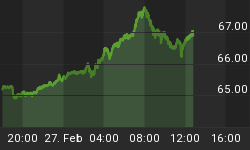Deutsche Bank chief economist Joseph LaVorgna has an eye on asset bubbles. So do others. Let's take a look at a couple of measures starting with a Deutsche Bank measure and see if we can spot a problem.
Bloomberg reports Deutsche Bank: This Measure of Household Finances Could Spur the Next U.S. Recession.
Those sanguine about U.S. recession risk aren't looking in the right place.
While standard measures of the real economy -- from inflation to the labor market -- nurture the Fed's optimism that the U.S. economy can withstand the impact of rate hikes, Deutsche Bank AG's chief economist Joseph LaVorgna sounds the alarm on financial excesses.
Specifically, a negative feedback loop from financial markets to the real economy could push the U.S. into recession, he says. He cites the ratio of U.S. household net worth to disposable personal income, which is now close an all-time record high, indicating net worth is growing faster than expendable earnings.
The net-worth-to-disposable-income ratio has staged an uptick since September last year, rising from 625 percent to 638 percent in the second-quarter of 2016.
While that is down from its cyclical high in the first quarter of 2015 -- and the record high of 650 percent notched late 2006 -- a ratio firmly above 600 percent portends turbulence, according to the analysts.
They cite the risk households would react negatively to any negative shifts in their net worth -- triggering a contraction in output.
"In the past, when the ratio rose above 600 percent, trouble was lurking," U.S. economists at the German bank write in a report on Tuesday, citing a collapse in the threshold during the bursting of the stock-market and housing bubble in 1999 and 2008, respectively. In this cycle, its increase has been principally driven by soaring stock prices, with house prices still 2 percent below their previous-cycle peak, the economists observe.
For the Fed, rising equity prices are effectively a feature, rather than a bug, of its post-crisis bid to reflate the U.S. economy through positive wealth-effects -- stimulating asset prices to incent consumption.
Buffett Valuation Indicator
Doug Short at Advisor Perspectives discusses Market Cap to GDP: An Updated Look at the Buffett Valuation Indicator.
Market Cap to GDP is a long-term valuation indicator that has become popular in recent years, thanks to Warren Buffett. Back in 2001 he remarked in a Fortune Magazine interview that "it is probably the best single measure of where valuations stand at any given moment."
The raw data for the "Buffett indicator" only goes back as far as the middle of the 20th century. Quarterly GDP dates from 1947, and the Fed's balance sheet has quarterly updates beginning in Q4 1951. With an acknowledgement of this abbreviated timeframe, let's take a look at the plain vanilla quarterly ratio with no effort to interpolate monthly data.
The strange numerator in the chart title, NCBEILQ027S, is the FRED designation for Line 41 in the B.103 balance sheet (Market Value of Equities Outstanding), available on the Federal Reserve website. Incidentally, the numerator is the same series used for a simple calculation of the Q Ratio valuation indicator.
Will Falling Equity Prices Trigger a Recession?
Bloomberg author Sid Verma makes a mistake, but a common one, when he refers to a "negative feedback loop". Such loops are stabilizing actually. What Verma really means is a positive feedback loop with negative consequences.
Stocks are clearly overvalued but will that trigger a recession in and of itself?
Housing Bubble vs. Stock Market Bubbles
The housing bubble was far more widespread than the stock market bubble. In addition, what equity assets most people have are in their IRAs and corporate stock plans, not immediately touchable assets without penalty.
People are far more willing to spend when home prices rise than when stock bubbles form. Home equity lines from 2005-2007 provides all the evidence one needs.
Still a feedback loop with negative consequences is indeed in play. However, a slowdown starts with an attitude shift towards spending, consumer worries about rising health-care costs, and corporate worries over a slowdown in earnings that leads to less hiring.
A spending slowdown by consumers and a slowdown in corporate earnings that leads to less hiring go hand in hand. The stock market will follow, and the cycle feeds on itself until the recession plays out.
LaVorgna has a legitimate worry, but it starts with an attitude change towards spending and hiring, not with a decline in the stock market.

















